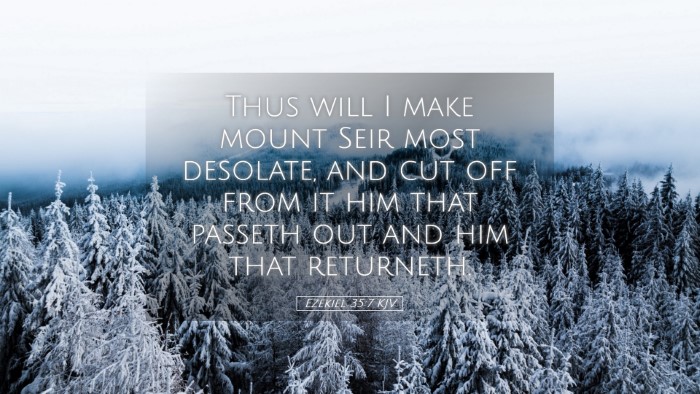Ezekiel 35:7 - Commentary Summary
Bible Verse: Ezekiel 35:7 - "Therefore, behold, I will bring upon thee a sword, and I will cut off man and beast from it."
Contextual Overview
The prophecy in Ezekiel 35 specifically addresses the nation of Edom and its enmity towards Israel. Edom had historically exhibited a malignant attitude towards the people of God, particularly during Israel's distress. This chapter serves as a declaration of divine judgment against Edom for their acts of violence and malice against God’s chosen people.
Theological Insights
Ezekiel 35:7 encapsulates a strong message of divine retribution. Herein lie several theological themes:
- Divine Justice: The verse exemplifies God’s commitment to justice, illustrating that evil actions will meet with inevitable punishment.
- Divine Sovereignty: This proclamation highlights God's authority over nations and His ability to enact judgment as He sees fit.
- Restoration of Israel: In context with the surrounding verses, the judgment against Edom is juxtaposed with God’s future restoration of Israel, embodying hope amid despair.
Commentary from the Church Fathers
Matthew Henry: Henry emphasizes the pertinence of God's judgments over Edom. He notes that Edom's pride and opposition to Israel's redemption would provoke God’s anger. The “sword” mentioned signifies the severe actions that God would execute against the nation, symbolizing destruction both for individuals and livestock. Henry highlights the completeness of the desolation—this would not merely affect people but also the land.
Albert Barnes: Barnes expounds upon the historical animosity of Edom towards Israel. He explains that Edom was not only guilty of inaction during Israel’s suffering but actively rejoiced in their downfall. Barnes points out that God's promise of judgment indicates an inevitable turning away of blessing from Edom, paralleling their actions against God's people. This aligns with the broader biblical narrative where nations are held accountable to God for their treatment of His chosen.
Adam Clarke: Clarke elucidates God’s method of judgment in Ezekiel 35, interpreting the “sword” as both literal and metaphorical. He underscores that this prophetic decree serves to warn other nations about the consequences of opposing Israel. Clarke points out that complete annihilation—man and beast alike—is a metaphor for total desolation, illustrating God’s thorough approach to eliminate the threats against His people.
Practical Applications
For pastors, theologians, and students of the Bible, Ezekiel 35:7 presents several practical observations:
- Accountability of Nations: It illustrates that nations and individuals will contend with the impact of their actions, stressing the importance of moral integrity, especially concerning dealings with God’s people.
- Courage in Adversity: Understanding God's sovereignty reminds believers to trust in God's justice, no matter the apparent success of oppressors.
- The Call to Love and Forgiveness: This passage challenges the faith community to reflect on our reactions to enemies and hardships, calling for a response of love rather than vengeance.
Conclusion
Ezekiel 35:7 serves as a stark reminder of God’s sovereignty and the principle of divine justice. By integrating commentary from historical biblical scholars, it becomes clear that God’s plans will unfold regardless of human opposition. For today’s believers, these insights underline the significance of standing firm in faith, ensuring that our actions align with God’s moral order, while looking forward with hope to divine restoration and justice.


